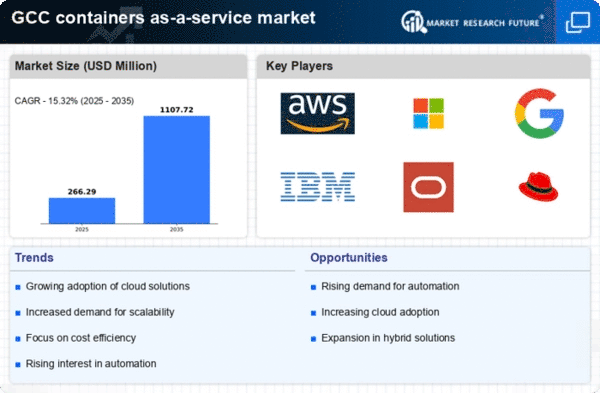Rising Demand for Scalability
The containers as-a-service market is experiencing a notable surge in demand for scalability solutions. Organizations in the GCC are increasingly seeking flexible infrastructure that can adapt to fluctuating workloads. This trend is driven by the need for businesses to respond swiftly to market changes and customer demands. According to recent data, the scalability features offered by containers as-a-service solutions can enhance operational efficiency by up to 30%. As companies expand their digital services, the ability to scale applications seamlessly becomes crucial. This demand for scalability is likely to propel the growth of the containers as-a-service market, as businesses prioritize solutions that can accommodate their evolving needs.
Enhanced Development Speed and Agility
The containers as-a-service market is significantly influenced by the need for enhanced development speed and agility. In the GCC, businesses are increasingly adopting agile methodologies to accelerate their software development processes. Containers facilitate rapid deployment and testing, allowing development teams to iterate quickly. This agility is essential in a competitive landscape where time-to-market can determine success. Data suggests that organizations leveraging containers can reduce deployment times by up to 50%. As the demand for faster development cycles grows, the containers as-a-service market is likely to benefit from this trend, as companies seek solutions that enable them to innovate swiftly.
Growing Focus on Digital Transformation
Digital transformation initiatives are driving the containers as-a-service market in the GCC. Organizations are increasingly investing in technologies that support their digital strategies, and containers play a vital role in this transformation. By enabling seamless integration of applications and services, containers facilitate the modernization of IT infrastructure. Recent statistics indicate that over 60% of GCC companies are prioritizing digital transformation, which in turn fuels the demand for containers as-a-service solutions. As businesses strive to enhance their digital capabilities, the containers as-a-service market is poised for growth, reflecting the broader trend of technological advancement in the region.
Cost Efficiency and Resource Optimization
Cost efficiency remains a pivotal driver in the containers as-a-service market. Organizations in the GCC are increasingly recognizing the financial benefits of adopting containerized solutions. By utilizing containers, companies can optimize resource allocation, leading to reduced operational costs. Reports indicate that businesses can achieve savings of approximately 25% on infrastructure expenses by transitioning to containers as-a-service models. This financial incentive encourages organizations to invest in container technologies, thereby stimulating market growth. As companies strive to enhance their bottom line, the focus on cost efficiency is expected to continue driving the containers as-a-service market forward.
Increased Collaboration and DevOps Adoption
The containers as-a-service market is benefiting from the rising trend of collaboration and DevOps adoption among organizations in the GCC. As companies seek to improve communication between development and operations teams, containers provide a unified platform that fosters collaboration. This approach enhances productivity and streamlines workflows, which is essential for successful project delivery. Data indicates that organizations implementing DevOps practices can achieve a 30% improvement in deployment frequency. As the emphasis on collaboration intensifies, the containers as-a-service market is likely to see increased adoption, as businesses recognize the value of integrated development environments.
















